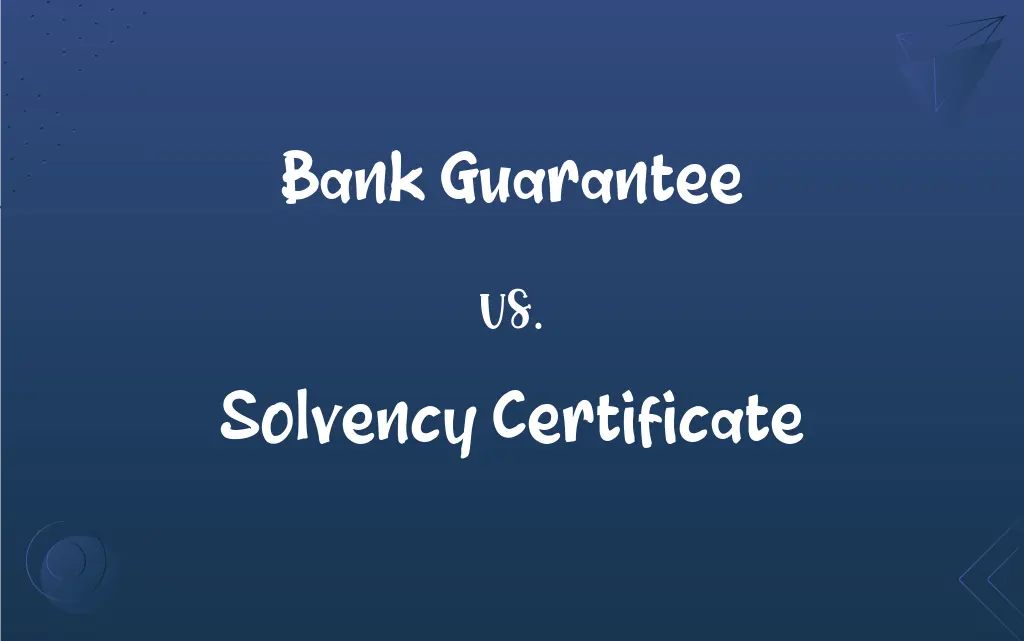Bank Guarantee vs. Solvency Certificate: What's the Difference?
Edited by Harlon Moss || By Janet White || Published on December 4, 2023
Bank guarantees assure payment on behalf of a client, while solvency certificates attest a person's financial stability.

Key Differences
A bank guarantee is a financial instrument where a bank ensures the payment or performance of a client's obligation. Conversely, a solvency certificate is issued by authorities to certify an individual's or entity's financial stability and ability to meet financial commitments.
The bank guarantee acts as a safety net for transactions, providing a form of insurance to the beneficiary. In contrast, a solvency certificate serves as evidence of financial health, often required in legal or financial proceedings.
Bank guarantees are commonly used in international trade and construction contracts, while, solvency certificates are often required for visa applications, court cases, or loan approvals, reflecting the individual's or company's financial standing.
The process of obtaining a bank guarantee involves a thorough assessment by the bank of the applicant's creditworthiness. On the other hand, acquiring a solvency certificate requires a detailed evaluation of one’s assets and liabilities.
Bank guarantees usually involve fees and are contingent on the client's ability to provide collateral. In contrast, solvency certificates are issued based on financial records and do not typically involve a direct cost.
ADVERTISEMENT
Comparison Chart
Purpose
Assures payment/performance obligations
Certifies financial stability
Common Usage
Trade, contracts
Legal proceedings, visa applications
Requirement for Issuance
Credit assessment, collateral
Analysis of assets and liabilities
Impact on Parties
Provides safety net for beneficiary
Evidence of financial health for holder
Cost Involved
Fees and potential collateral
Usually no direct cost, based on records
ADVERTISEMENT
Bank Guarantee and Solvency Certificate Definitions
Bank Guarantee
A security mechanism in transactions, issued by banks.
The bank guarantee eased the investor's concerns about the startup's solvency.
Solvency Certificate
A certification indicating sufficient assets to cover liabilities.
The solvency certificate proved the company was financially healthy.
Bank Guarantee
A promise by a bank to cover a client's debt if they default.
The contractor obtained a bank guarantee to assure the project owner of timely completion.
Solvency Certificate
A document certifying an entity's financial stability and ability to meet obligations.
His loan application was strengthened by a solvency certificate.
Bank Guarantee
A bank-issued document that acts as a safety net in financial agreements.
The bank guarantee was essential for the small business to secure the lease.
Solvency Certificate
An assurance of an individual's or firm's capability to fulfill financial commitments.
The solvency certificate was necessary for the contractor to bid on the project.
Bank Guarantee
A bank's commitment to pay a beneficiary if the client fails to meet specific criteria.
To win the tender, the company provided a bank guarantee to the government.
Solvency Certificate
An official statement of financial soundness and liquidity.
The court requested a solvency certificate to proceed with the case.
Bank Guarantee
A financial tool ensuring the fulfillment of a client's contractual obligations.
The supplier required a bank guarantee before shipping the goods.
Solvency Certificate
A financial attestation often required for legal and business transactions.
For her visa application, she provided a solvency certificate.
FAQs
Who requires a solvency certificate?
Individuals or businesses needing to prove financial health, often for legal or business reasons.
What is a bank guarantee?
It's a bank's promise to cover a client's obligations if they default.
Are there fees for bank guarantees?
Yes, usually involving fees and potentially collateral.
Can anyone obtain a bank guarantee?
They are typically available to clients with good credit and collateral.
How is a solvency certificate obtained?
Through financial analysis by relevant authorities based on assets and liabilities.
In what scenarios are bank guarantees used?
Primarily in trade, contracts, and where financial security is needed.
Can a bank guarantee fail?
Yes, if the bank or client becomes insolvent.
What does a solvency certificate indicate?
It certifies an individual's or company's financial stability and ability to meet debts.
Who issues bank guarantees?
Banks and financial institutions.
What's the key difference between the two?
Bank guarantees are transactional securities, while solvency certificates are financial health attestations.
Is there a cost for a solvency certificate?
Generally, there's no direct cost; it's based on financial records.
Does a solvency certificate expire?
Yes, it's usually valid for a specific period and needs regular updating.
Are bank guarantees internationally recognized?
Yes, they are widely recognized in international trade and finance.
What's the legal significance of a solvency certificate?
It can be crucial in legal proceedings to establish financial credibility.
Is a solvency certificate necessary for personal transactions?
It can be required for personal loans, visa applications, or legal cases.
What happens if a bank guarantee is invoked?
The bank pays the beneficiary per the guarantee's terms.
Are there alternatives to bank guarantees?
Alternatives include letters of credit, surety bonds, or insurance guarantees.
Who issues solvency certificates?
Government authorities or certified financial entities.
Can a solvency certificate be contested?
Yes, if there are doubts about its accuracy or the entity's financial status.
Can small businesses obtain bank guarantees?
Yes, if they meet the bank's criteria for creditworthiness and collateral.
About Author
Written by
Janet WhiteJanet White has been an esteemed writer and blogger for Difference Wiki. Holding a Master's degree in Science and Medical Journalism from the prestigious Boston University, she has consistently demonstrated her expertise and passion for her field. When she's not immersed in her work, Janet relishes her time exercising, delving into a good book, and cherishing moments with friends and family.
Edited by
Harlon MossHarlon is a seasoned quality moderator and accomplished content writer for Difference Wiki. An alumnus of the prestigious University of California, he earned his degree in Computer Science. Leveraging his academic background, Harlon brings a meticulous and informed perspective to his work, ensuring content accuracy and excellence.






































































